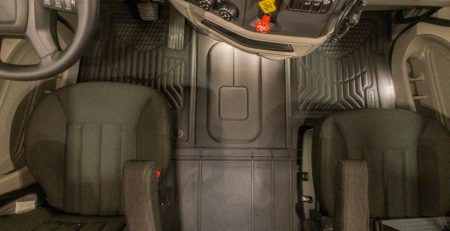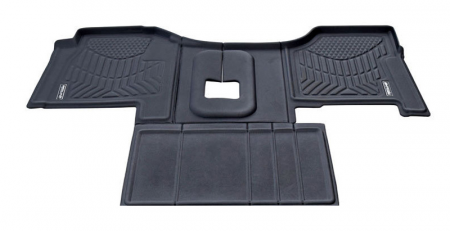10 Tips: Buying A Used Truck
Purchasing a used truck can be exciting. However, it can also be a complex process, made all the more complicated based on a lack of preparation and emotions getting in the way. Following are 10 tips to help you find a vehicle that will not only do the job, but will also make you happy.
1. Determine what you need and want in a truck. Considerations should include:
- What will you be transporting, and will your loads have a variety of weights?
- What types of terrain and routes will you encounter?
- If leasing, are there any required or special truck and equipment specifications, or any limitations on truck age and configuration?
- How many miles will you log each year?
- What are your expectations for fuel economy?
- Do you have any powertrain preferences?
- Are there upgradable components?
- Has the truck been well maintained?
- Are there any remaining warranties and/or are other warranties available?
- Is the truck comfortable?
- What features and components are must-haves, and what are your like-to-haves?
I’ve found it helpful to write down the answers to these questions and carry them with me as I look at used trucks. This helps me stay focused and not overlook anything.
Realize that when you buy a used truck, you’re purchasing a vehicle that was originally spec’d by the original purchaser. You need to be flexible and willing to make some compromises. Find a truck that meets your needs and preferences as closely as possible, without making any major modifications.
2. Determine how much truck you can afford. Aside from the purchase price, downpayment and monthly payments, factor in other expenses, including fees, taxes, insurance, fuel and maintenance.
3. Review the truck’s maintenance history. This information is invaluable as it provides an accurate account of the truck’s preventive maintenance, service and repair history.
4. Perform a thorough hands-on inspection to evaluate the truck’s overall condition. I always bring along a pair of coveralls, work gloves and a flashlight, so I can conduct an “up-close and personal” evaluation. If you’re not mechanically inclined, engaging the services of a professional truck technician is strongly recommended.
Conduct the inspection during the daytime as darkness may conceal problems. Also, don’t perform an inspection in the rain, because it may hide nicks and scratches and can make thin, worn paint look shiny.
I’ve found it useful to use a detailed, step-by-step checklist for inspecting both the interior and exterior of the truck. Ask the truck seller or you can prepare your own.
5. Take a test drive. If, after the inspection, you’re still interested in the truck, take a test drive. Here again, a checklist—that you or the used truck seller provides—is beneficial.
In general, see how the tractor feels, handles, responds and sounds. If possible, pull a loaded trailer on city streets and Interstates, including up and down hills. Decide whether you can visualize yourself operating this truck for the next few years.
I use a mini tape recorder during my test drives to note any problems or concerns, as well as to record my thoughts and
observations about the truck.
6. Don’t trust your memory. The recordings—along with the notes and comments made on my inspection checklists—are a great help in narrowing the search and comparing several trucks that I’m seriously considering.
It is best to not trust your memory. With the passage of time, and after looking at several trucks, it’s often difficult to remember the particulars of each one.
7. Request a walkaround. When you decide upon a truck, have the salesperson conduct a complete walkaround to familiarize yourself with the vehicle. Have him or her point out the truck’s various features and explain the function of each switch, control and gauge.
The walkaround is also the ideal time to have the salesperson explain the truck’s maintenance requirements. The original manufacturer of the truck and its major components can also provide relevant information.
8. Set a PM (preventive maintenance) schedule. Good maintenance practices are essential as they help eliminate avoidable problems. Making a repair during a scheduled PM is considerably less time consuming, aggravating and costly than requiring emergency service for an on-the-road breakdown.
I work with my used truck salesperson to create a regular maintenance program and schedule. The best advice one salesperson gave me was to start setting money aside every month for the inevitable maintenance and repairs.
9. Ask questions. Don’t be afraid to take up a salesperson’s time, and don’t be concerned about asking too many questions. You can never have too much information upon which to make the wisest buying decision. An Internet search for information and complaints from truck owners can also add to your decision-making knowledge base.
10. Stay in control. Don’t get talked into buying a truck you don’t want, no matter how great the bargain might seem, or because “this deal won’t be there tomorrow.” When buying a used truck, the old adage, “you get what you pay for,” usually applies.
Keep your emotions out of the truck-buying process. It is a thrilling and emotional time that can frequently cloud one’s judgment. Until next time, remember, good truck-buying luck comes to those who do their homework!
Source: www.roadking.com
Visit us:
301 W Gerri LnAddison, IL 60101
Contact us:
Phone: +1 224 422 2829
Mail: info@tire-max.com










